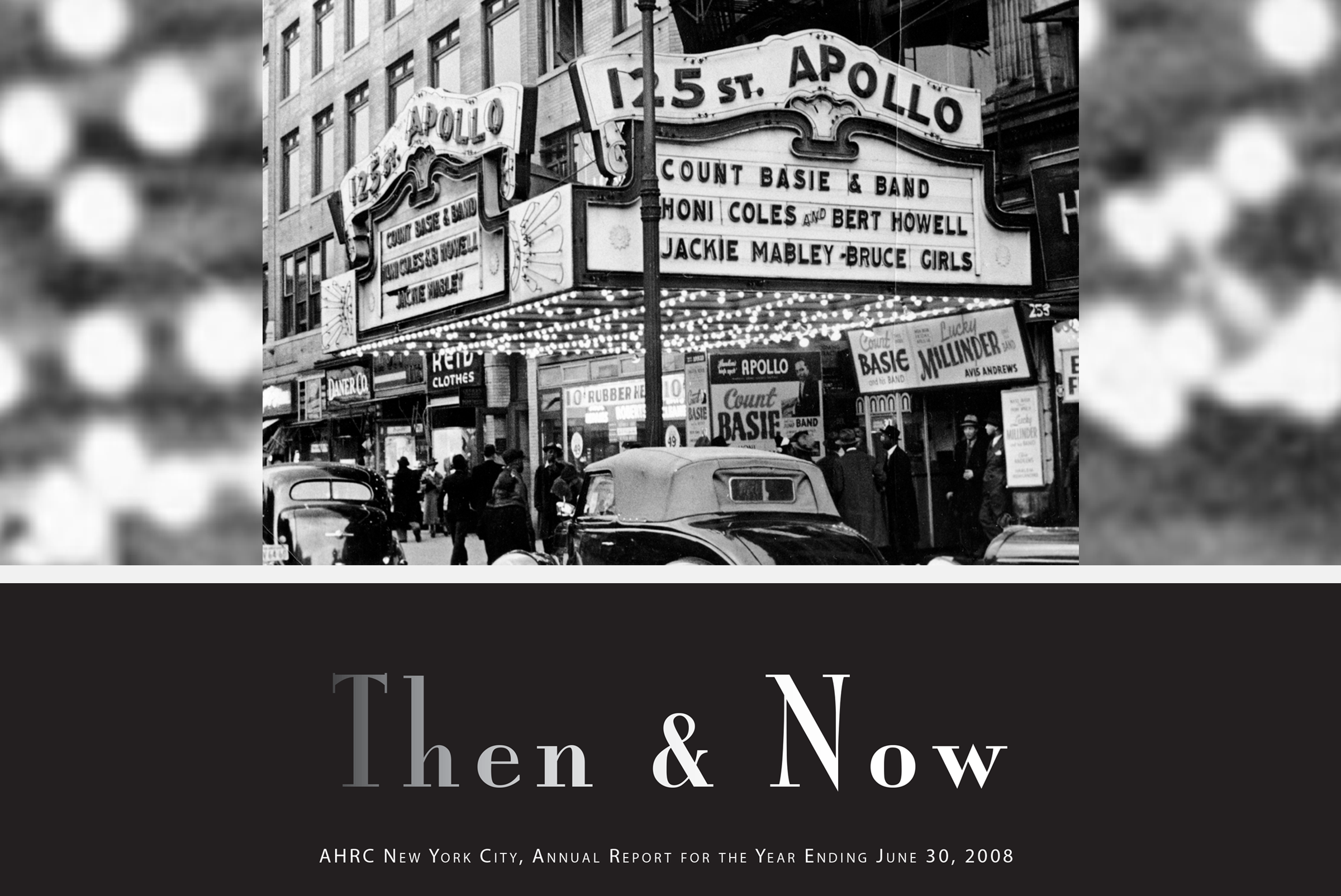A trailblazer in many ways, AHRC’s evolution has mirrored that of the field. In 1948, the organization fought to create and fund services that had not previously existed. Over the decades an unparalleled array of services were developed, and individuals with developmental disabilities were given opportunities to learn and grow in the programs that proliferated in the community.
We are proud to announce the publication of AHRC New York City’s Then & Now, AHRC New York City’s Annual Report for the Year Ending June 30, 2008. (opens pdf file)
Today, programs and services are allowing the individuals supported to explore their interests, develop their talents and make decisions about their lives. Years have past. Some things remain seemingly untouched by time. …And many things are so very different!
Our Mission
AHRC New York City, a family governed organization, is dedicated to enhancing the lives of individuals with intellectual and developmental disabilities and their families.
Our Values
Each member of the organization is committed to promoting a culture that embraces:
Passion:
Committing wholeheartedly to the mission of the agency.
Respect:
Responding to all members of the AHRC community with courtesy, kindness and open and honest communication.
Integrity:
Making decisions based on fairness, honesty, morality and ethical principles.
Diversity:
Respecting and appreciating the differences found among individuals with intellectual and developmental disabilities, their families and our colleagues.
Excellence:
Providing an environment in which distinction and merit are affirmed, celebrated and enhanced.
AHRC New York City
The organization that created the first schools, workshops, day treatment programs and community residences, continues to meet the needs of the individuals served in its programs. We offer individuals with intellectual and developmental disabilities a menu of supports, programs, and services tailored to meet their specific wishes and needs.
For infants, toddlers and children, AHRC offers: evaluations to determine the nature of a child’s delays; information and referral to programs; early intervention comprised of various therapies and education services provided in the home or at a center-based program; preschool programs for children with developmental delays; a specialized array of services for children with autism, (preschool, elementary and middle/high school) that utilizes Applied Behavioral Analysis (ABA), as well as other specialized techniques; speech, physical and occupational therapies; psychological counseling; Head Start classes; inclusive programs where children with disabilities learn alongside their peers without disabilities; and educational advocacy to ensure that all school-age children receive the services to which they are entitled.
For adults, AHRC offers: a variety of opportunities with varying degrees of structure and support, where adults – from young adults to senior citizens – can engage in activities during the day that will enhance their skills of daily living, work for pay, volunteer in the community and provide them with supports necessary for community exploration; supported employment in AHRC-run businesses, as well as opportunities for competitive employment; specialized services for persons with traumatic brain injuries; alcohol and substance abuse treatment; training to prevent domestic violence; residential opportunities in group homes, supervised apartments and independent settings, and residential services for medically frail individuals and those requiring 24/7 nursing services.
For individuals of all ages, and their families, services include: day camp, sleep-away camp and recreation programs; primary medical care and referrals to specialty care; clinical services such as evaluation and testing, speech, physical and occupational therapies; case management and service coordination; counseling and mental health services; home care services; a variety of respite opportunities to give families a break from the job of caretaking; sibling services for typical children who have sisters and brothers with disabilities; legal services including guardianship, future planning and information regarding entitlements; family education; information and referral services.
A MESSAGE FROM THE PRESIDENT
Arlene Pedone
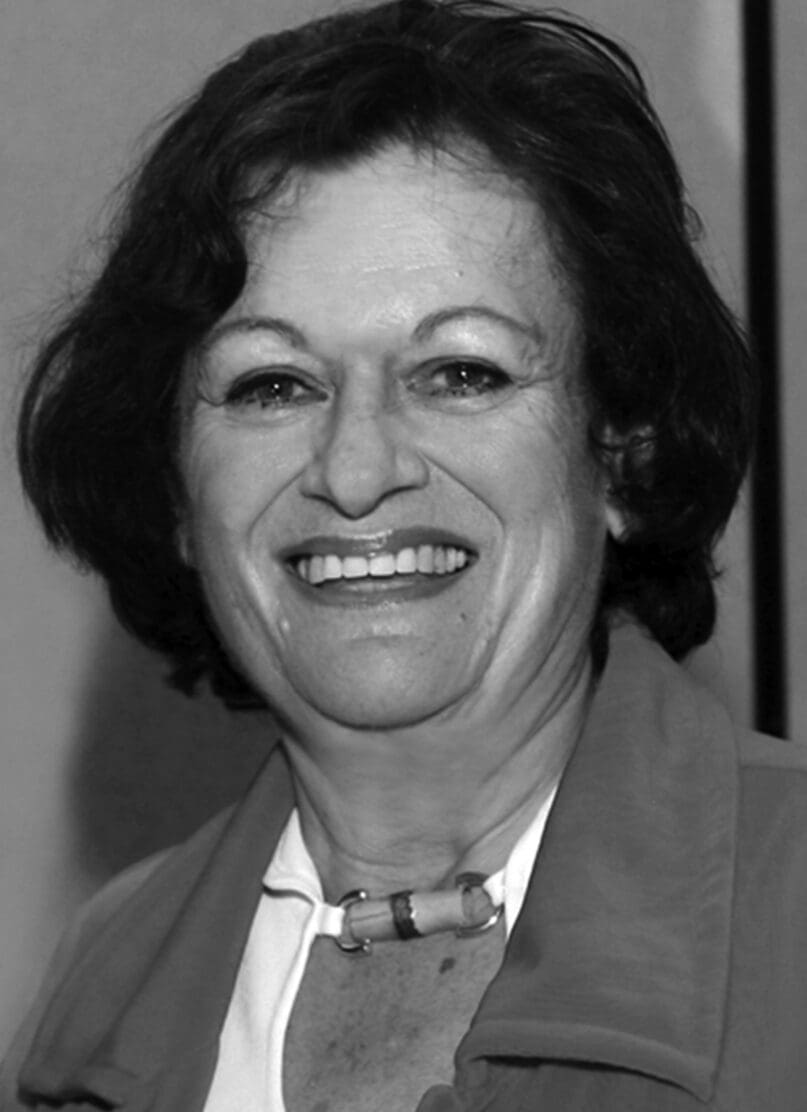
As we celebrate our 60th Anniversary, our organization and our field face a dire situation amidst the unprecedented fiscal crisis our country, state and city are experiencing. Cuts are being made to services that our constituents must have to support their independence and well being. Despite the disturbing reality of our fiscal crisis, this organization is morally bound to forge ahead and do everything we need to do to sustain the quality of life the people we serve have attained. We will not go back to the days when individuals with developmental disabilities could not get services.
On the pages of this report you will read about the many programs and services that AHRC provides to over 15,000 individuals annually. These services are essential to the people we serve. There has been talk of cuts to day programs for adults. There has been talk of cuts in residential development. There has been talk of cuts to many other programs. However, we will not accept cuts to our programs that will negate the progress that has been made to provide reasonable supports to the individuals we serve. We cannot.
I am very proud of everything that our family–governed organization has accomplished in these 60 years. And I feel passionately about ensuring that the people we serve, and their families, receive what they need to live the productive lives to which they are entitled. We owe them no less.
A MESSAGE FROM THE EXECUTIVE DIRECTOR
Michael Goldfarb
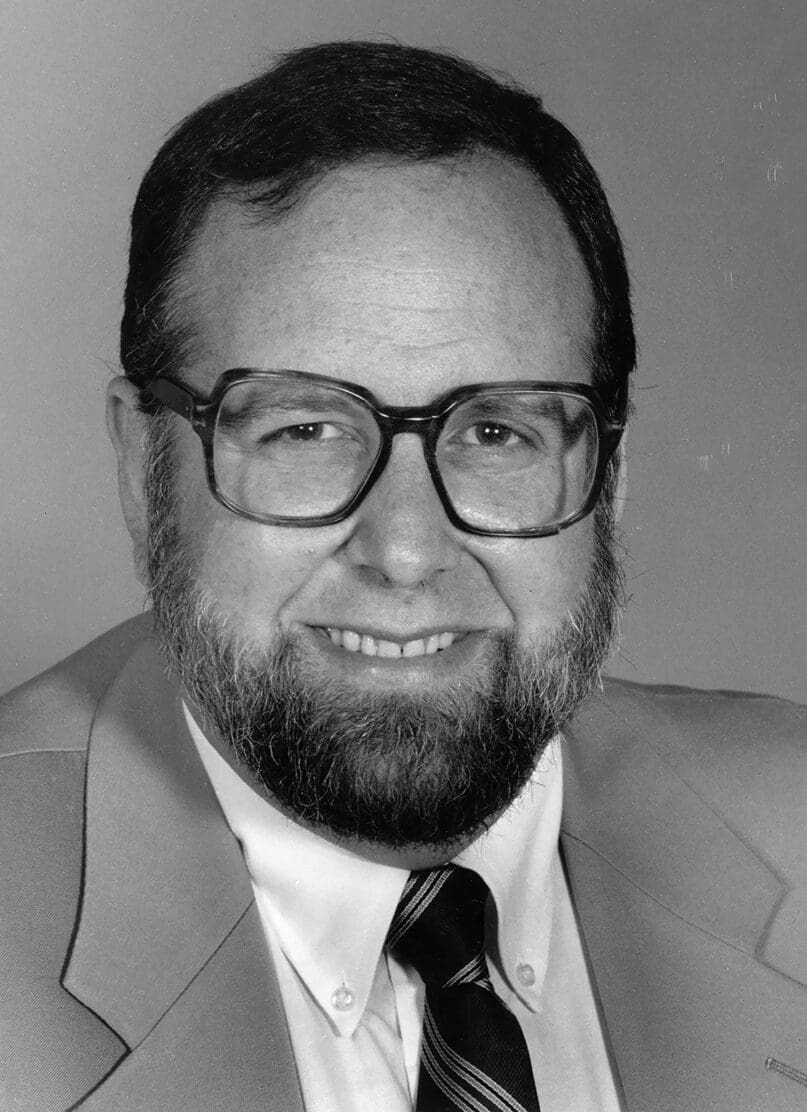
We are living in very challenging times. New York State faces a financial crisis worse than any in recent history. AHRC’s primary responsibility is to protect people with developmental disabilities from suffering any loss of needed services, programs and supports resulting from changes that ensue.
As a field we have grown enormously over the last forty years. We have weathered the ups and downs in the economy and have reinvented our service system many times. We will need to do this again. Today is different. The economy is in straits far more dire than at any other time since the Great Depression. But we will persevere and succeed.
Our commitment to the individuals we serve and their families is unwavering. And as a result of what organizations like AHRC have created over sixty years, society is aware that individuals with disabilities are deserving of and entitled to the supports necessary to live productive lives. There is no going back on this point. Together we will find the way to proceed.
It is the eve of AHRC’s 60th anniversary. There is a great deal to celebrate and there will be more to celebrate in the years to come!
New York Then & Now
This annual report for fiscal year ending June 30, 2008 is being written on the eve of AHRC’s 60th Anniversary.
Very fittingly, the photographs that are featured herein are those of New York sixty years ago juxtaposed alongside photos of the same locations today! The old photographs were researched, and the new photos taken, by individuals who are members of the photography groups at AHRC’s Fisher Center and the Walter & Evelyn Redfield Center, both located in Manhattan. They are primarily photographs of the neighborhoods in which these two AHRC sites are located, (Harlem and downtown Manhattan.)
Below you will see their work and meet these avid photographers!
The photos are a snapshot of New York City and the changes that have ensued in the last six decades. More importantly, the fact that these photographs were taken by individuals with developmental disabilities who aspire to be photographers is a testament to how much AHRC has changed in these 60 years!
Years have past. Some things remain seemingly untouched by time. And many things are so very different!
A trailblazer in many ways, AHRC’s evolution has mirrored that of the field. In 1948, the organization fought to create and fund services that had not previously existed. Over the decades an unparalleled array of services were developed, and individuals with developmental disabilities were given opportunities to learn and grow in the programs that proliferated in the community. Today, programs and services are allowing the individuals supported to explore their interests, develop their talents and make decisions about their lives.
Day Services Photography Groups
The photography groups from AHRC’s Fisher Adult Center and the Walter & Evelyn Redfield Center worked on the “Then and Now” project over the course of a year. The centers, one located on 125th Street in Harlem, and the other on William Street in downtown New York, are both history-rich neighborhoods in New York City. The hands-on educational project was fun and an innovative approach to teaching the process of taking, editing, and printing digital photos.
A Time Comparison at 135th Street
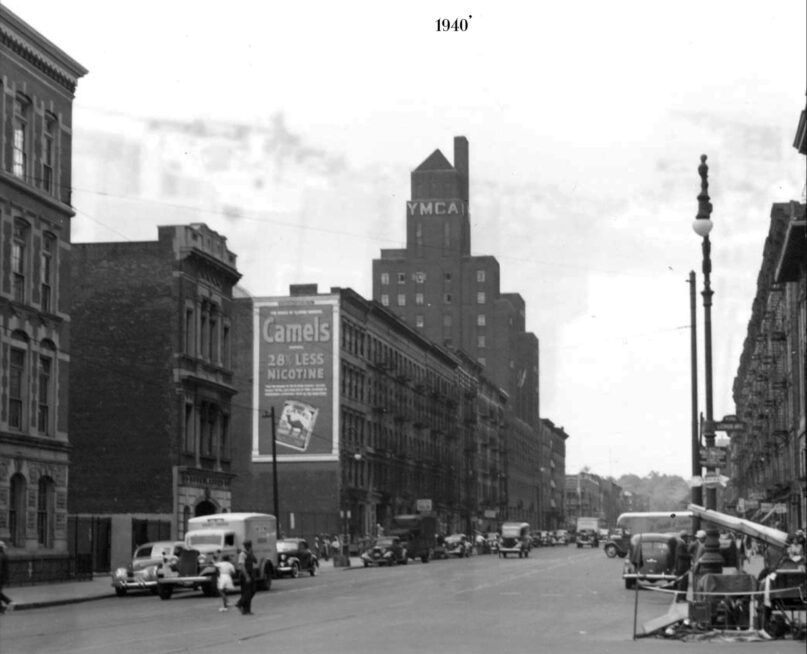
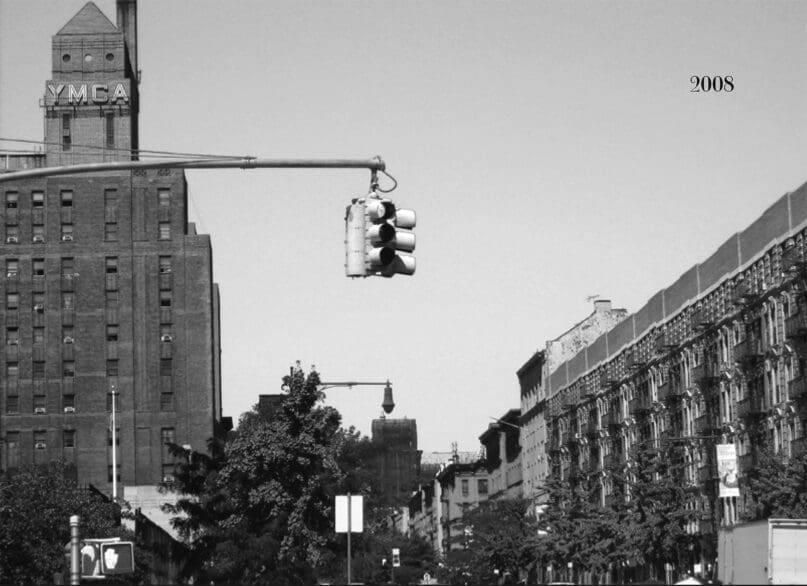
At AHRC’s adult programs, individuals select activities from a list that may be of interest. They attend these groups every day. The groups last an hour and the individuals supported at each center can select new groups twice a year.
The photography groups use both digital and Polaroid cameras. They handle all aspects of the photographic process, from taking the pictures to either developing the prints or editing and digitally printing the files on the computer.
A Time Comparison at New York Public Library’s Schomburg Center for Research in Black Culture, in Harlem.


The “Then and Now” project began in February 2008. The eight group members from the Fisher Center visited the New York Public Library’s Schomburg Center for Research in Black Culture, in Harlem. The individuals from the Walter & Evelyn Redfield Center did their online research at New York Public Library’s (NYPL) Mid-Manhattan Library, and New York University’s Library.
For months, the groups visited their respective library to search online and look through book archives for “before” photos of buildings, stores, signs, streets, automobiles, famous venues, and other famous landmarks in their neighborhoods.
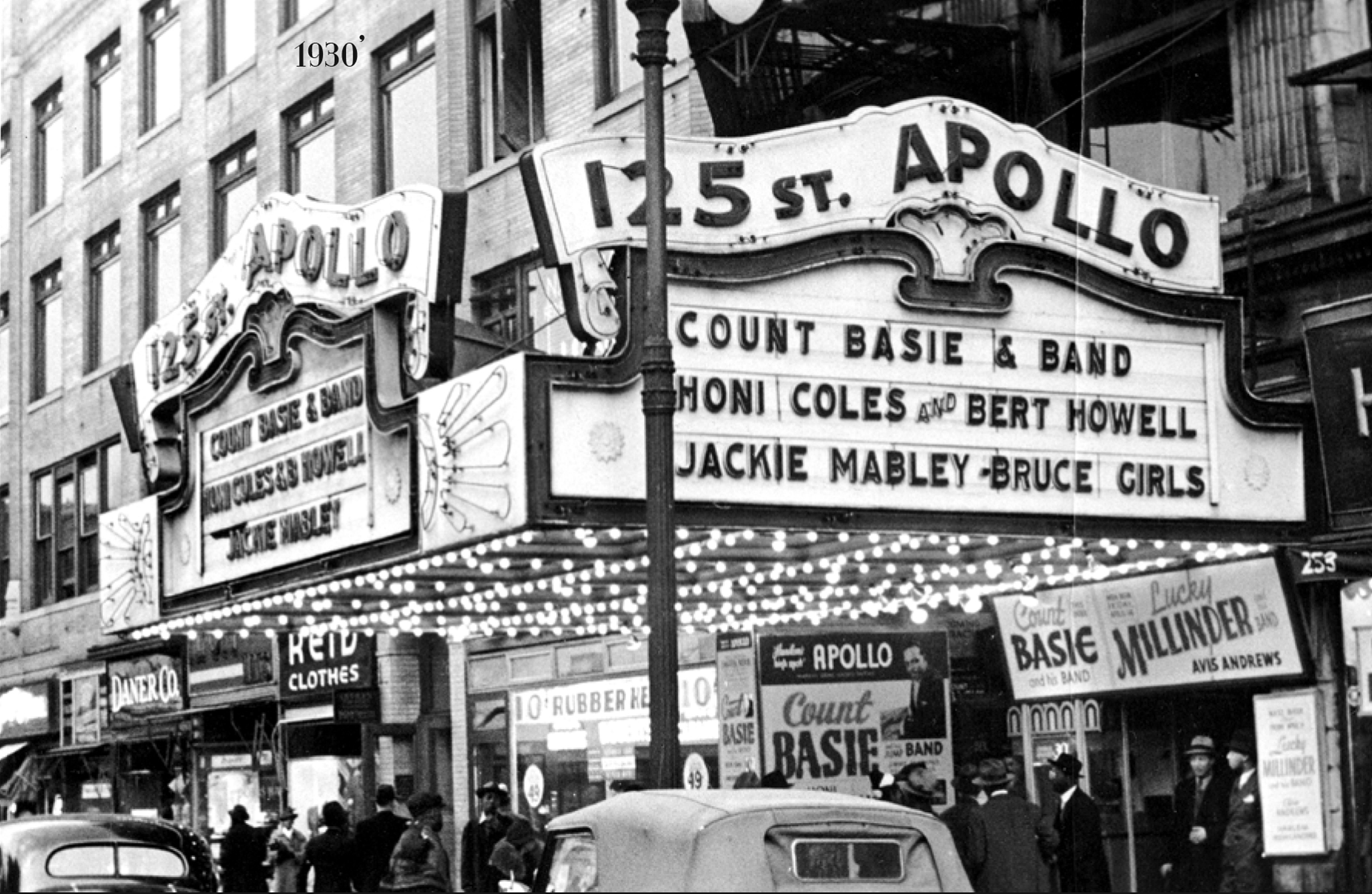
Once the eight individuals in the Fisher group selected photos, they, along with staff members Sonia Stewart, Shaniqua Smith, and Kashka Glowacka, traveled out into the community to track down the exact locations of the “then” landmarks. These included the famous Apollo Theater, as well as the Alhambra Ballroom, which dates back to 1926, and hosted performers such as Billie Holiday and Bessie Smith.
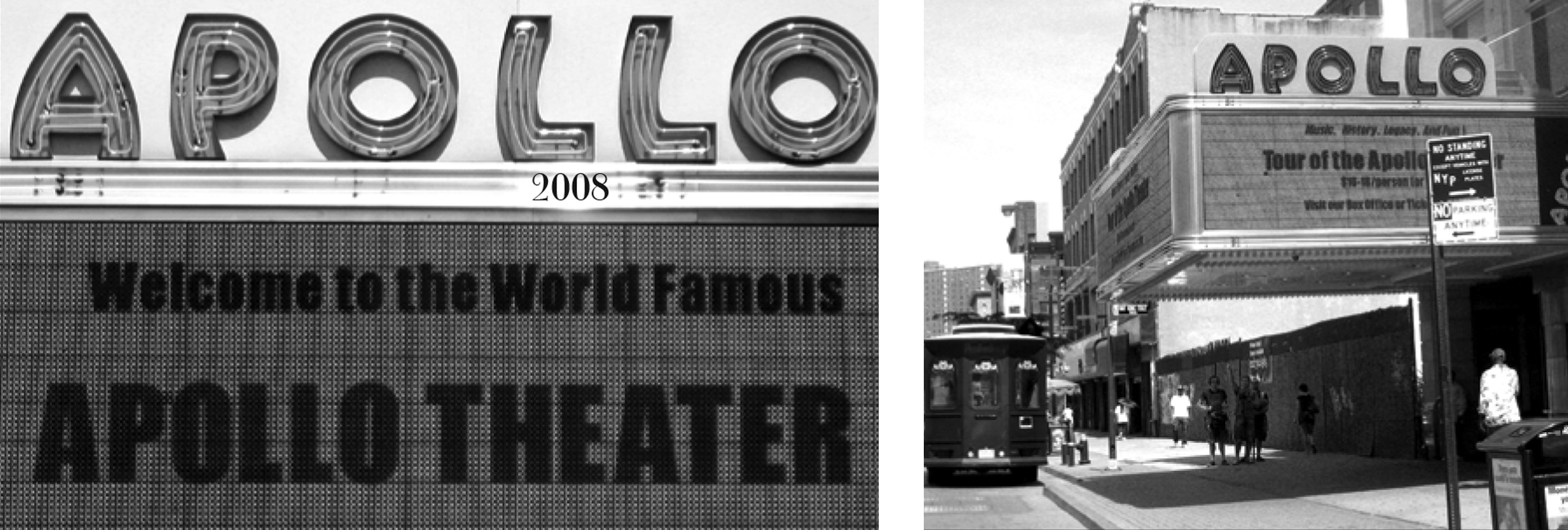
Some of the sites looked exactly as they did decades ago, while others showed changes that paralleled Harlem’s evolution into a 21st century neighborhood.
William Street’s Photographers
William Street’s photographers, with the help of Activity Specialist, Inessa Parshin, used the internet to do their initial research. Before visiting the NYPL’s Mid-Manhattan Library, they searched online for the history of places like South Street Seaport, the financial district, the Brooklyn Bridge, City Hall Park and the New York Stock Exchange.
The Brooklyn Bridge
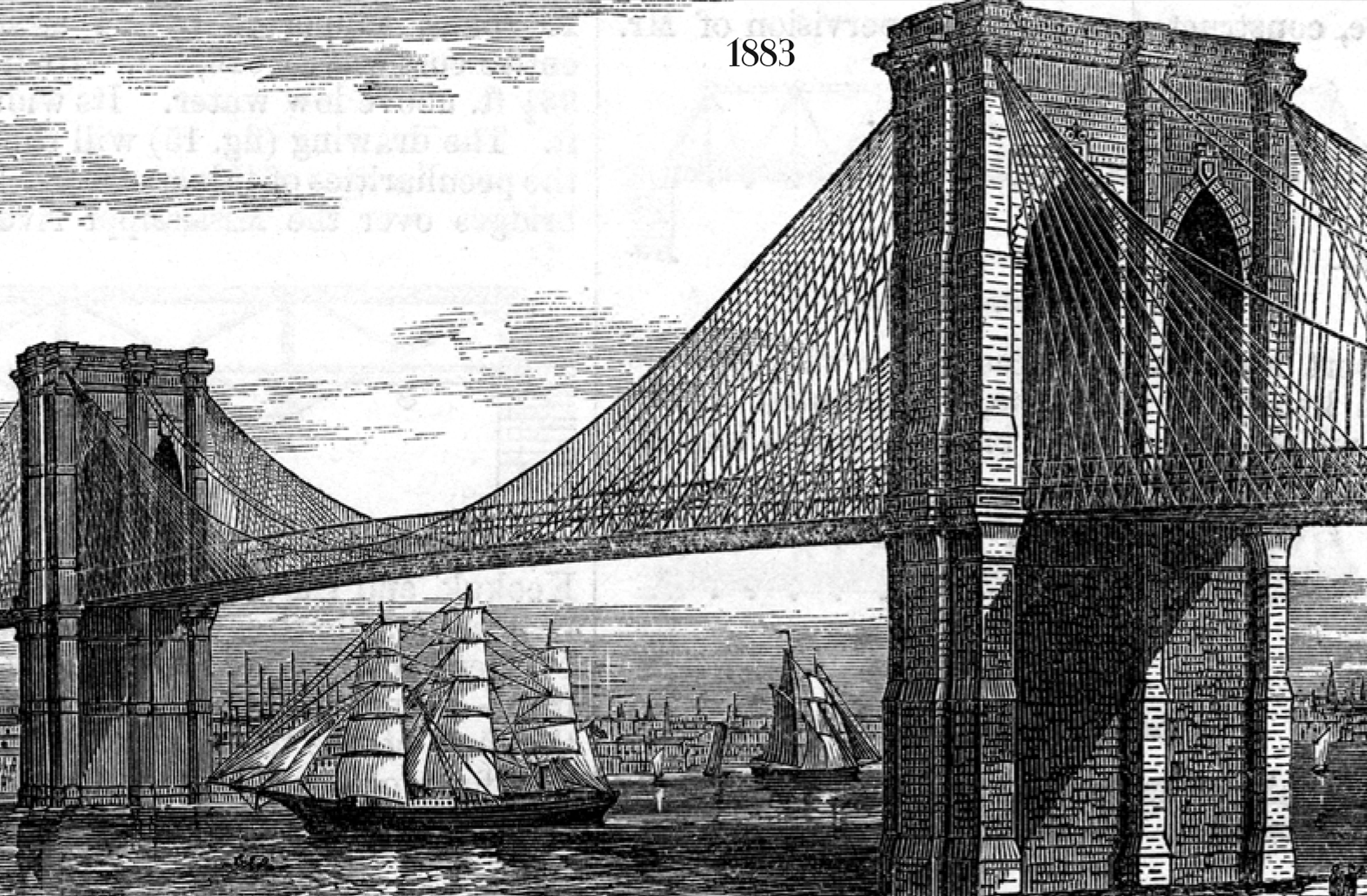
Once familiar with downtown Manhattan’s history, the group explored the NYPL’s book and electronic archives looking for photographs of the sites they found interesting. Like the Fisher group’s experience in Harlem, many of the “now” locations had changed dramatically, while others, located in a historical neighborhood of Manhattan, had been surprisingly preserved.
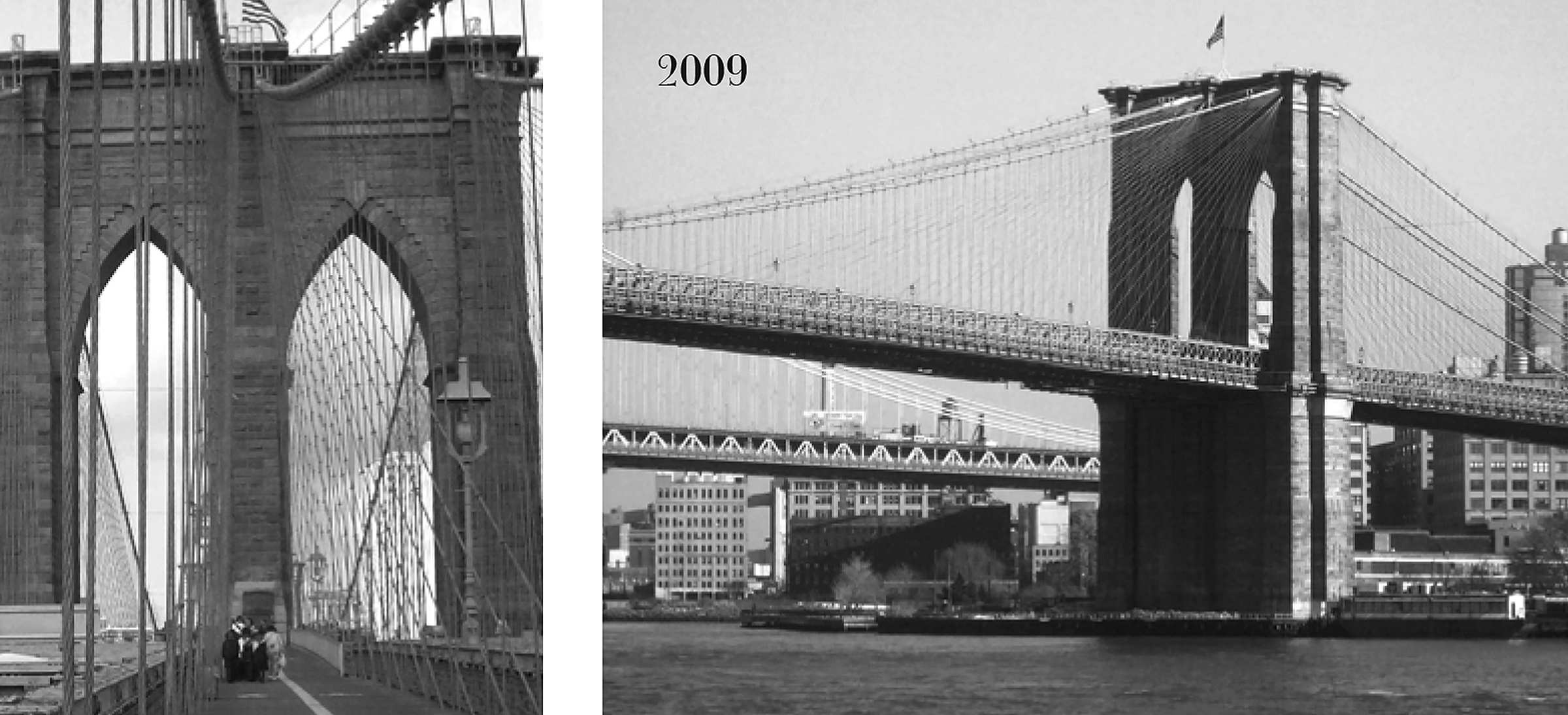
The group from William Street enjoyed this project so much that they all became members of NYPL’s Mid-Manhattan Library, and plan on visiting the library once a month.
South Street Seaport





The completed “Then and Now” photos from Harlem were designed into a calendar entitled, “Harlem: Then and Now,” by the Fisher group. William Street’s group is still in the process of completing their work, and plans to host a photo exhibit for family, friends, AHRC staff, and downtown community members to view!
Fisher Center Photographers
Rick has a unique approach to photography. During the group’s sessions, he tends to drift off on his own, finding unlikely objects to photograph. Rick’s alternative perspective allows him to capture beauty in even the mundane of things—and bring it to life.

Jonathan, who is very artistic, helps show others how to use the camera and upload the photos to the computer. Defying expectations, Jonathan’s Cerebral Palsy (CP) does not affect the stillness of his shots—they all turn out perfect.
Walter & Evelyn Redfield Center Photographers
“I find history to be very interesting—all of the landmarks around us—I guess you can say I’m a history bug,” admitted Gilda. Through this process, Gilda also discovered that the “computer is very informative,” she said. “I would love to have an exhibition,” boasted Gilda.
I want to show everything that we’ve accomplished and learned from this project.
Gilda Lindenblatt
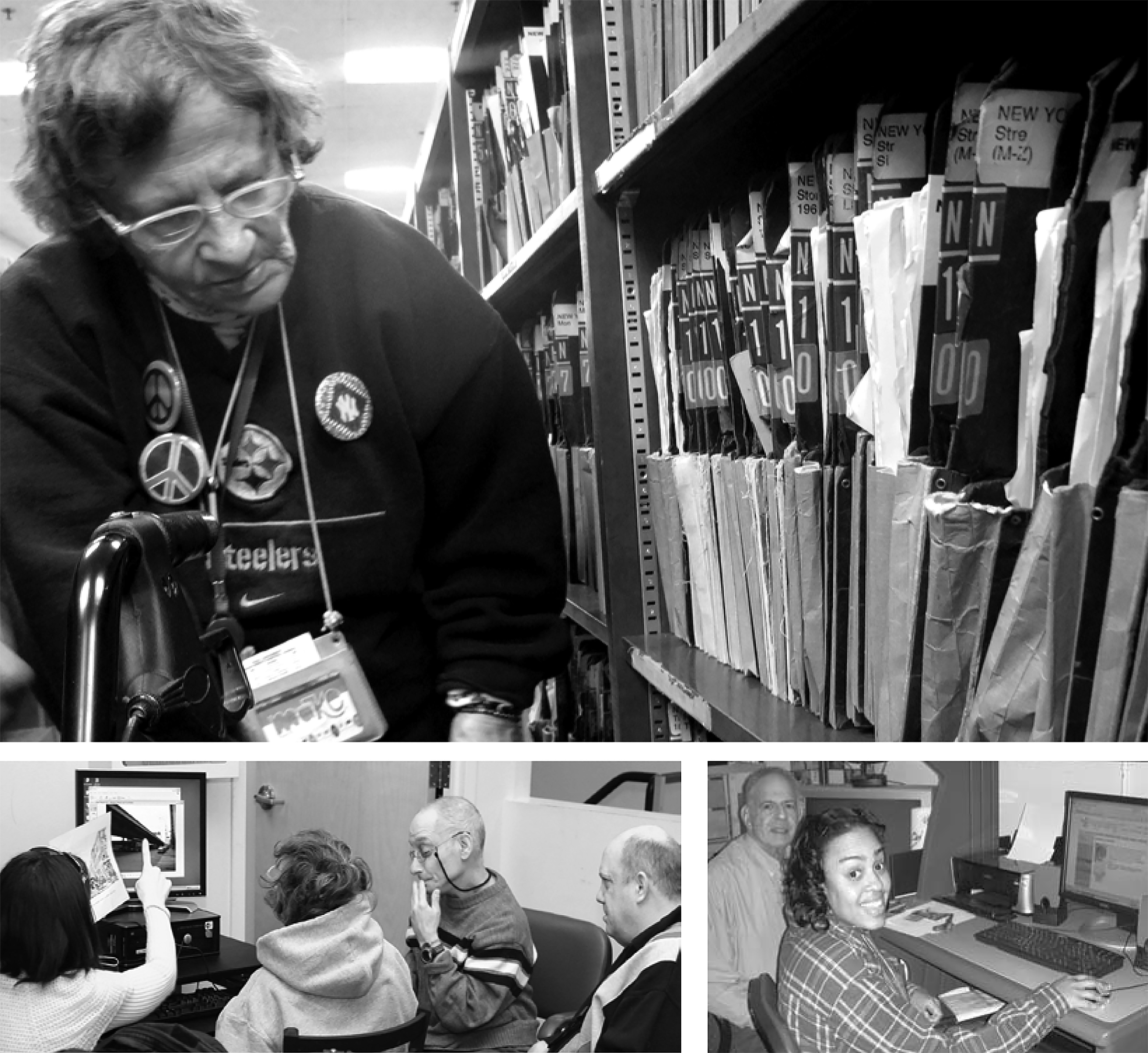
Larry, a self-professed “boat lover,” said his favorite part of the project was “travelling to South Street Seaport,” where he snapped photos of the current day Pier 17 port, including its stores, docks, and ships. Today, downtown Manhattan’s seaport serves more as a tourist site, but Pier 17 was once a bustling harbor for ships entering New York along the East River.
I’ve really come to love the library and researching in it—it’s a new experience for all of us.
Shanice Valez
“I plan on going to the library a lot,” said Shanice, who expressed her passion for taking pictures of interesting scenery and historical landmarks throughout Manhattan.
Highlights of the Year Ending June 30, 2008
In 2007 and 2008, AHRC New York City continued to provide a wide array of services and supports to individuals with developmental and intellectual disabilities, and their families. In addition, new services and supports were developed to meet emerging needs and existing programs were enhanced and expanded. All new programs designed by AHRC aim to use the principles of person-centered planning, with the goal of creating truly individualized supports that are responsive to the choices expressed by the people who will use them.
SERVICES AND SUPPORTS FOR CHILDREN AND ADOLESCENTS
AHRC serves 900 children in its early intervention program, at four preschools, an elementary school and a middle/high school. The department has served large numbers of children on the autism spectrum in specialized programs for well over a decade now.
Highlights of the years include:
AHRC’s Department of Educational Services
- AHRC’s preschools continue to thrive under the leadership of their principals. Their reputation for excellence brings many new families to the AHRC schools.
- Francis of Paola is the next AHRC preschool school slated for NAEYC accreditation (the national recognized gold standard for early childhood providers). The Howard Haber Early Learning Center received this designation last year. AHRC is working with Quality of New York towards that end with a self assessment taking place in 2009. The principal of Francis of Paola school is the president of the New York chapter of NAEYC.
- The relocation of the Brooklyn Blue Feather Elementary School to Gerritsen Beach, Brooklyn has turned out to be a wonderful move. The neighborhood and the school district have been very receptive and welcoming. Under the direction of a new principal, the children are thriving in the new building complete with a large gym/cafeteria; media/library; and Snoezlen (sensory integration) room.
- AHRC’s Middle/High School is also doing well under the direction of our newest principal, who although new to the school, has worked in the Education Department as an Evaluator for approximately 18 years.
- Approximately 95 children of the 136 children who attend the Middle/High School are participating in an internship program that allows them to go out into the community to gain worthwhile vocational experience under the leadership of the Department’s Vocational Coordinator.
- “Building Futures”, funded by the FAR Fund has allowed the Middle High School students and their families, as well as the administration and staff, to continue to implement Person-Centered Plans developed to create a pathway to a desired transition to adult life. Older students spend increasing amounts of time in community internships. (For example, serving lunch at a senior center, cleaning tables at Dunkin Donuts, doing office work at the Catholic Migration Center). These internships were developed to fulfill the desires expressed by individual students through the Person-Centered Planning process.
- Music, drama and dance have been added to our K- 12 curriculum (both elementary and middle/high schools) so that our students receive a well-rounded education like their typical peers who attend public schools.
- AHRC is introducing Relaxation Therapy and Visual Imagery to all our schools to help students handle daily stressors, and provide them with coping mechanisms.
- All AHRC schools are being introduced to technology through computers, augmentative or assistive technology devices, and GPS systems. Additionally, Tech for Everyone, a computer software program used in AHRC’s Adult Services, is being introduced to ensure that all children in all of our schools receive hands-on experience with computers.
AHRC’s Educational Advocacy Service
AHRC continues to provide direct advocacy services to individuals and training to families throughout the five boroughs who are in need of assistance in obtaining the appropriate educational services to which they are entitled under federal law. In addition to undertaking the resolution of individual cases, the department has provided training to five hundred families at 18 different training sites on topics that include:
- Graduating Families training for parents of graduating preschool students
- The Pre School to School Age Transition
- Individualized Education Plan Workshops
- Autism and Educational Services
- Advocacy Skills
- Educational Advocacy Skills
- Special Education in the Courts an Update
- A Special Education Update
In addition – The Director of Advocacy Services co-coordinates Parents for Inclusive Education and was involved in organizing and facilitating Parent Speak Outs on Special Education in all five boroughs. He presented testimony before the City Council Education Committee about the reorganization of the Special Education system in NYC DOE.
SERVICES AND SUPPORTS FOR ADULTS
AHRC continues to provide services and supports to 1,400 adults throughout the city in a variety of settings. The focus is to support adults with developmental disabilities, including traumatic brain injury and autism, in their efforts to live a self-determined and meaningful life in the community.
Highlights of the year include:
AHRC’s Department of Adult Day Services
- The Adult Day Services Department has accelerated its Person-Centered Planning initiatives. These initiatives and others are helping to reshape the services and supports offered by the department so that, in the near future, each of the individuals served will have the opportunity to fulfill the valued social roles of their choosing in the community.
- The Melissa Riggio Higher Education Program at The College of Staten Island and Kingsborough Community College, college based programs designed to prepare people with intellectual and developmental disabilities for adult life through higher education coursework, career exploration and preparation, were opened in Fall 2008. Designed to provide individualized academic, vocational, community and social experiences for young adults in a highly supportive yet challenging environment, the students have the same opportunities for social and personal growth as other young adults at the college level.
- The Adult Day Services Department, in partnership with the Department of Employment and Business Services, has been awarded Enhanced Supported Employment opportunities by OMRDD to provide more intensive supports in the workplace to a number of people who would otherwise not be able to participate in community employment. This is an addition to the services an individual current receives.
- Creative expression has been a significant area for many of the people served by the Department of Adult Day Services. This year we have had artists exhibit in several branches of the New York City Library, the Topaz Gallery in Queens, the lobby of the Inter-Agency Council, and many other venues. With the introduction of the Artistic Realization Technologies (A.R.T.), people with severe physical restrictions can also find a means to express themselves. Working with another person referred to as a “tracker” and using a series of “yes” and “no” questions, the individual defines the color, texture, and design on canvas. Anyone who can nod or blink or otherwise indicate positive or negative responses can create whatever they can imagine.
- AHRC’s small business, Cartridge King, in which people remanufacture printer toner cartridges for sale to the business community, has expanded. We have begun operations in Queens in addition to our original Manhattan operation and will soon expand to Brooklyn. The recent application of assistive technology to help people follow as many as 75 steps for each of the many different cartridges we handle has opened these jobs to a much larger number of people.
- A new Medicaid Waiver, B2H, (Bridges to Health Waiver), has allowed us to provide services and supports to children with developmental disabilities living in foster care that are similar to those we provide to adults. The department is providing day habilitation to support these young people in exploring their communities and preparing for the challenges of the adult world. Residential Habilitation Services are provided to this same group through the Home Care Department. The impact on foster families and the young people being served has been dramatic and positive.
The Department of Employment & Business Services (EBS)
EBS continues to support almost 700 individuals with developmental disabilities in their efforts to be employed in jobs that they find meaningful and satisfying. In addition to individuals who are employed in a variety of jobs, EBS runs the CAREERS job training in janitorial and food services program, Hudson River Services, an affirmative janitorial services company that has 25 contracts with New York City and State agencies, and the Job Connection Center, a “clubhouse” for individuals with mental health challenges in addition to intellectual and developmental disabilities. Services that have been added to the EBS menu in the last year include:
- “Opening Doors to Employment” for individuals with and without disabilities through internship opportunities throughout New York City. Young Adult Internship Program (YAIP) – is an AHRC Staten Island program that helps young adults with and without disabilities to find employment by first assisting them to obtain an internship in an industry of their choice. During this internship the City of New York pays them an hourly wage. This program has helped many young adults to find not only internships, but eventually paid employment at places like Snug Harbor, H&R Block, and many other companies.
- AHRC received an award from the Snug Harbor Cultural Center on Staten Island for Volunteer of the Year award. For several years, EBS has worked with Snug Harbor sending them interns from our YAIP program to perform janitorial and maintenance work.
- The OMRDD Internship Program – is an 18-month internship program started by the Office of Mental Retardation and Developmental Disabilities. This program is for individuals with developmental disabilities who have faced great barriers in finding work. Individuals are found internships in industries of their choice and receive a wage from the state. OMRDD interns currently work at ABC Carpets, Metropolitan Hospital, and the YMCA.
- As described above in the Department of Adult Day Services, Enhanced Supported Employment gives AHRC the opportunity to both take people out of our existing adult day centers, and to help young adults transitioning out of the department of education who would not traditionally enter supported employment and guide them successfully in to the world of work by allowing these individuals to work part time with intensive supports.
- AHRC’s affirmative business, Hudson River Services, a janitorial service company employing 80% individuals with developmental disabilities, were informed that the building they have a contract to clean 271 Cadman Plaza – Brooklyn New York – has, for the second time, won the Mid-Atlantic Government Building Award. Although, there are many factors that go into achieving this award, cleanliness and overall building appearance is one such factor!
Department of Residential Services
AHRC currently serves close to 545 individuals in a variety of residential alternatives, with greater and greater numbers of people choosing to live independently. The development of residences is a constant and ongoing process. In the last year the following residential development was begun:
- AHRC purchased a house in Queens that will be home to six individuals.
- AHRC purchased an apartment in Manhattan that will be home to six individuals.
- The Department hosted tours to professionals from France and Japan who wanted to learn about the residential opportunities AHRC provides to individuals with developmental disabilities.
- HomeBuilders-NYC funded by OMRDD and the Developmental Disabilities Planning Council (DDPC) has allowed ten individuals who have received support through Individual Services and Supports (ISS) funds from OMRDD, live in their own homes. Many of these individuals also get Residential Habilitation support from AHRC’s Department of Home Care so that they can further develop the skills needed to live independently in the community.
- Groundbreaking commenced for a four apartment complex to be built on 126th Street in Manhattan, modeled after the Mitchell & Susan Bloomberg Apartments for special needs individuals in Jamaica, Queens.
SERVICES AND SUPPORTS FOR INDIVIDUALS OF ALL AGES
Highlights of the year include:
Home Care Department
The Home Care Department continues to provide in-home residential habilitation services and supports to families to assist them in meeting their caregiving responsibilities. These services are provided to Medicaid eligible families who have children and adults with developmental disabilities in all five boroughs. Services are provided for anywhere from 4 to 20 hours a week, depending upon need and availability. In the last year the Department of In-Home Services:
- Has received approval to provide 19 additional Residential Habilitation At-Home opportunities.
- Several new participants were accepted into the Traumatic Brain Injury Waiver program operated by the Home Care Department.
- Superior Direct Care, Inc., a subsidiary of the Home Care Department, initiated two new contracts, one with the Institute for Community Living and the other with FEGS.
Department of Recreation and Camping
AHRC continues to operate two wonderful camps upstate, (Camp Anne and Harriman Lodge), school holiday respite programs for families in all five boroughs, as well as a menu of recreation programs for children and adults throughout the five boroughs. These services provide social and leisure time, opportunities of growth, and discovery to over 1,500 individuals – children through adulthood — in over 50 program settings in the last year. Highlights of the year were:
- Camp Anne served 525 participants in six different sessions.
- Camp Anne welcomed a new director in spring 2008.
- Camp Anne built three new fully accessible cabins, which allows for greater flexibility in camper placement.
- The main living spaces for campers and counselor staff are now in the same “neighborhood” on the camp property, which has freed up some older buildings for new use as program space.
- Camp Anne offered horseback riding for the second year and had a very positive site visit from the Warner Fund, who had provided part of the start-up costs for the program.
- The perennial program favorites such as swimming, boating, arts, sports and nature activities were continued; and new activities included work with a music specialist, making pottery in the crafts area and making a video of each session.
- The college course entitled “A Multi-Disciplinary Approach to Developmental Disabilities” was taught to the staff at both camps this year. Nine seasonal staff successfully completed the six-credit undergraduate course.
- Harriman Lodge provided services to 368 guests during five different sessions and added a new Assistant Director.
- Harriman Lodge completed a three-year window replacement project in the main building at camp. This upgrade improved three wings of the building, which serve as the dining hall, program building and health center.
- The health center had some additional upgrades and re-purposing of treatment rooms. This inviting space allows guests to feel more comfortable while they are being treated in the health center.
- Our newest recreation program, Autism Awareness, is funded through the New York City Council. We have a received a grant to provide wrap-around services for teens residing in Brooklyn. This program is provided in two different settings – after school programming at the AHRC Middle/High School in Bensonhurst and on weekends twice a month for teens with autism who meet for socialization and pre-planned field trip experiences. Fifteen teens with ASD participate.
Department of Family and Clinical Services
AHRC’s Department of Family and Clinical Services, known as the “AHRC Clinic,” continues to provide quality medical and clinical services to thousands of individuals annually. The “clinic” is actually comprised of several different entities that provide individuals and families with necessary medical, social and psychological supports. New initiatives in the last year have included:
- AHRC Health Care received Federally Qualified Health Center (FQHC) status on August 1, Some of the benefits of this status include: an increased annual grant funding for operating expenses; higher rates of reimbursement from Medicaid and Medicare; ability to provide services to a larger group of patients; and a lower cost prescription drug program.
- AHRC Health Care will be doing business as ACCESS Community Health Center.
- AHRC Health Care also received a grant from the New York State Department of Health (NYDDOH) to build a dental suite at 83 Maiden Lane. The construction has commenced.
- And AHRC has received a grant through the City Council and New York State Department of Health (NYSDOH) to begin keeping Electronic Health Records.
- OMRDD has provided AHRC with a grant to administer additional ADEPT evaluations, to conduct research and program evaluation and disseminate the findings to the public on use of the geriatric medicine model of care with individuals who have developmental disabilities at all ages.
- And DDPC renewed a grant for AHRC Health Care to train Beth Israel’s Medical Residents in intellectual disability medicine to work with parents of children with intellectual disabilities.
- AHRC continues to provide sibling services, running “sibshops” 3 times a year with 20 – 25 children in each group and this year added a Teen Sibs group that meets the first Saturday of every month. AHRC’s Sibling Committee additionally hosted a Sibling Social Event at Bayards, a restaurant in downtown New York on March 9th. Eighty two people attended this lovely social event for siblings of individuals with developmental disabilities.
- Guardianship events were held at the offices of two law firms that have offered their services pro bono to AHRC’s Guardianship Program. Gibson Dunn & Crutcher LLP and Willkie Farr & Gallagher are the two firms.
- In addition to the usual complement of therapies, AHRC’s Article 16 Clinic started a weight management program dedicated to treating obesity in people with intellectual and developmental disabilities. The program utilizes cognitive behavioral therapy and a positive support approach. Program participants learn behavioral skills that will increase their likelihood for weight loss maintenance and positive self esteem.
- AHRC’s Medicaid Service Coordination program has continued to serve greater numbers of people and now serves over 1000 individuals The expansion of this program necessitated renovations and development of more working space.
OTHER AHRC NEWS
AHRC’s Maiden Lane building has allowed for the opening of a Staff Training Center on its 13th floor where staff can be trained in the topics mandated by government, as well as topics requisite for maintaining a quality workforce. Other support departments, those of IT, Human Resources, Public Information, and Finance have also greatly expanded their initiatives in the effort to support AHRC’s work, that of assisting the individuals we serve to live richer lives. For example, an Entitlements Unit was created to assist AHRC and the individuals we support to obtain and maintain their Medicaid and other benefits. The Entitlements Unit works with the Medicaid funded program departments to assist individuals and their families to both enroll in benefit programs and to do what is necessary to stay benefit eligible.
In 2008, AHRC celebrated its 59th anniversary and Congressman Charles Rangel received AHRC’s Humanitarian Award. An expanded Family Education Series was launched with multiple monthly sessions being held at Maiden Lane and in the 5 boroughs. Additionally AHRC kept its members abreast of the changing political landscape that greatly affects the work that we do.
AHRC New York City looks forward to offering people with developmental and intellectual disabilities, and their families, greater opportunities to lead productive and fulfilling lives in the community in the years to come.
For the Year Ending June 30, 2008
EXPENDITURES
| Total Support for the Current Period | $ 218,200,771 |
Program Services
| A. Educational Services | $ 28,498,243 |
| B. Adult Day Programs | $ 59,888,027 |
| C. Residential Services | $ 52,202,274 |
| D. Family and Clinical Services | $ 7,881,142 |
| E. Employment and Business Services | $ 20,005,037 |
| F. Camping & Recreation Services | $ 3,898,160 |
| G. In-Home Services | $ 6,563,588 |
| H. Family Support Services | $ 2,821,725 |
| I. AHRC Health Care, Inc | $ 4,164,301 |
| J. AHRC Home Care Services Inc | $ 1,001,729 |
| K. Superior Direct Care Inc | $ 5,314,415 |
| Total Program Services | $ 192,238,641 |
| Supporting Services | $ 25,759,481 |
| Total Expenditures | $ 217,998,122 |
| Excess of Revenue Over Expenses | $ 202,649 |
| Unrestricted Fund Balance—July 1, 2007 | $ 37,841,917 |
| Unrestricted Fund Balance—June 30, 2008 | $ 38,044,566 |
You may obtain a copy of our last Annual Report by writing to us or to the New York State Department of Law, Charities Bureau, New York, NY l0271
AHRC NEW YORK CITY Programs, Services and Supports
AHRC Administrative Offices
83 Maiden Lane
New York, NY 10038
Phone: 212-780-2500
Fax: 212-780-2353
Department of Adult Day Services
Bronx Intensive Support Day Habilitation Services, Bronx NY
Dorothy and Michael Styler Center, Bronx, NY
William F. May Adult Center, Bronx, NY
Brooklyn Day Habilitation, Brooklyn, NY
Dean O’Hare Center, Brooklyn, NY
Stephen B. Siegel Center, Brooklyn, NY
Bush Terminal Day Hab, Brooklyn, NY
Betty Pendler New York League Work Center, New York, NY
Anthony Fisher Center, New York, NY
Sobriety Day Habilitation, Brooklyn, NY
Cyril Weinberg Center, Long Island City, NY
Traumatic Brain Injury – Training & Quality Assurance, New York, NY
Traumatic Brain Injury – Community Support Services (TBI-CSS), Brooklyn & Bronx, NY
Far Rockaway Center, Far Rockaway, NY
Joseph T. Weingold Center, Sunnyside, NY
Walter & Evelyn Redfield Center, New York, NY
Business and Employment Services
HIRE Supported Employment Program, Manhattan, Queens, Bronx, Brooklyn & Staten Island, NY
CAREERS in Janitorial and Food Services, Brooklyn & Bronx, NY
Job Connection Center, Brooklyn, NY
Hudson River Services, Manhattan, Brooklyn, Queens, Bronx & Staten Island, NY
Horizons Day Hab Without Walls and HIRE, Staten Island, NY
Careers Young Adult Internship Program (YAIP), Staten Island, NY
Horizons Day Hab & Prevocational Center, Bronx, NY
HIRE Community Employment Supports, Bronx, NY
OPTS Senior Retirement Group, Bronx, NY
Transition Center Vocational Training Program, Manhattan, Woodside & Bronx, NY
Model Transition Program, Manhattan & Bronx, NY
Department of Camping and Recreation
Camp Anne, Ancramdale, NY
Harriman Lodge, East Jewett, NY
Recreation Services, New York, NY
Day Respite Programs
Brooklyn, Bronx, Manhattan, Queens, Staten Island, NY
Department of Family and Clinical Services
AHRC Health Care Inc. DBA Access Community Health Center Manhattan, Bronx, Queens & Brooklyn, NY
Chemical Dependency Treatment Clinic, New York, NY
Article 16 Clinic, Manhattan & Bronx, NY
Bronx Early Childhood Direction Center (ECDC), Bronx, NY
Legal Services: Guardianship and Future Care Planning, New York, NY
Crisis Team, Bronx, NY
Sibling Support Services, New York, NY
Department of Medicaid Service Coordination
serving all five boroughs
Department of Individualized Supports
serving all five boroughs
Department of Educational Services
Howard Haber Early Learning Center, Bronx, NY
Brooklyn Blue Feather Elementary School & Evaluation Center, Brooklyn, NY
AHRC Middle/High School, Brooklyn, NY
Francis of Paola Early Learning Center & Evaluation Center, Brooklyn, NY
Esther Ashkenas Early Learning Center, New York, NY
Astoria Blue Feather Early Learning Center, Astoria NY
Department of Educational Advocacy
serving all five boroughs
Department of In-Home Services
AHRC Home Care Inc.
In-Home Respite
In-Home Residential Habilitation Services
Superior Direct Care Services (SDC)
Department of Residential Services
95th Street IRA, New York, NY
Fineson House, New York, NY
Melvin W. Kraus Residence, New York, NY
Malozemoff Residence, New York, NY
Phyllis and Harold B. Jacobs Residence, New York, NY
Manhattan IRA, New York, NY
New Gotham, New York, NY
East 106th Street, New York, NY
Elena Agovino Residence, Bronx, NY
Bronx IRA (Netherland Avenue), Bronx, NY
Chicquor Residence, Bronx, NY
Greenberg Residence, Bronx, NY
Fairfield Avenue IRA, Bronx, NY
Hunter Avenue IRA, Bronx, NY
Mayflower IRA, Bronx, NY
Thurman Munson Residence, Bronx, NY
Wilson Avenue IRA, Bronx, NY
81 Ocean Parkway IRA, Brooklyn, NY
400 Ocean Parkway IRA, Brooklyn, NY
Lillian and Jack Isaacson Residence, Brooklyn, NY
Blue Feather—Minna Bober IRA, Brooklyn, NY
Betty Carubia IRA, Brooklyn, NY
Seymour Rubin IRA, Brooklyn, NY
Gus Jacobs IRA, Brooklyn, NY
Striar House, College Point, NY
Mina and George Hirsch Residence, Little Neck, NY
Bellrose IRA, Bellrose, NY
163rd Place IRA, Flushing, NY
Eugene Fierstein Residence, Flushing, NY
Union Turnpike, Flushing, NY
186th Street, Fresh Meadows, NY
204th Street IRA, Bayside, NY
Bayside IRA, Bayside, NY
Helen Armstrong Residence, Ozone Park, NY
Fresh Meadows Residence, Fresh Meadows, NY
Cunningham League IRA, Fresh Meadows, NY
Gruenstein Residence, Bayside, NY
Mitchell & Susan Bloomberg Apartments, Jamaica, NY
North Hills Leagues IRA, Bayside, NY
58th Avenue IRA, Elmhurst, NY
254th Street, Little Neck, NY
Jimmy O’Neil Residence, Fresh Meadows, NY
Pembrooke IRA, Bayside, NY
Peterson House, Staten Island, NY
Ralph I. Rossi Residence, Staten Island, NY
Kensington IRA, Staten Island, NY
East Tenafly IRA, Staten Island, NY
Lander Avenue, Staten Island, NY
Tysens Lane, Staten Island, NY
Supportive Apartments
Brooklyn Supportive Apartments, Brooklyn, NY
Staten Supportive Island Apartments, Staten Island, NY
Queens Supportive Apartments, Queens, NY
Bronx Fordham Hill Supportive Apartments, Bronx, NY
Manhattan Supportive Apartments, New York, NY
Day Respite Programs
Brooklyn, Bronx, Manhattan, Queens, Staten Island
Overnight Respite
Thelma Ragland Respite Houses Brooklyn, Bronx, Manhattan, Queens, Staten Island
Weekend Hotel/Recreation Respite
Brooklyn, Bronx, Manhattan, Queens, Staten Island
Department of Finance, Budgets and Contracts
Department of Real Property
Department of Public Information
Department of Staff Training and Development
Department of Human Resources
IT Department
Department of Administrative Services
AHRC New York City Officers and Board of Directors as of June 2011:
OFFICERS
Arlene Pedone
President
Gail Fishkind
1st Vice President
2nd Vice President
Marilyn Jaffe Ruiz
3rd Vice President
4th Vice President
Genevieve O’Neil
5th Vice President
Joshua Hirsch
Treasurer
I. William Stone
Financial Secretary
Mark Bini, Esq,
Recording Corresponding Secretary
BOARD OF DIRECTORS
Toni Agovino
Sabretta G. Alford
Blanche Fierstein
Edward J. Garvey
Melvin Gertner, MD
Anne Gordon
Laurence B. Isaacson, Esq;
Laura J. Kennedy
Charles King Jr
Meri Krassner
Edward J. Leahy
Victoria Liska
James P. Murphy, Esq
Edith Niedert
Nancy Petrino
Ruth Pickholz,Esq
Joan Raineri
Michael N. Rosen, Esq.
Nilsa Santiago,Esq.
Germaine Laviscount Scott
Jeanne Sdroulas
Lee Slonimsky
Sharyn J. VanReepinghen
Tina Veale
Kerry Wright
Michael Goldfarb
Executive Director
Judith DeIasi
Associate Executive Director
Robert Gundersen
Associate Executive Director
Ellen Rosman
Associate Executive Director
Gerald Gartner
Chief Financial Officer
Ann Greenberg
Founder
Like AHRC, the AHRC New York City Foundation helps thousands of children and adults with developmental disabilities achieve day to day living that is as rich, absorbing and worthwhile as possible, and to provide opportunities for them to live up to their maximum potentiality in the community.
As a supporter of the AHRC New York City Foundation you can help!
You can support the AHRC New York City Foundation in a variety of ways. The AHRC New York City Foundation is grateful for all contributions including gifts of cash or securities, as well as those in the form of charitable bequests through wills and estate plans. The AHRC New York City Foundation’s pooled income fund can benefit both the Foundation and you, the donor. Memorial gifts honoring people on special occasions will be acknowledged as requested by the donor.
Your tax deductible contribution to the AHRC New York City Foundation, Inc. can be made
at any time by check, money order or credit card.
For further information about sending a donation or about the tax and income benefits
of making a planned gift, write or call:
AHRC New York City Foundation, Inc.
83 Maiden Lane
New York, NY 10038
212 780 2690
www.ahrcnycfoundation.org
Written by: Shirley Berenstein and Kate Mammolito
Design: Kashka’s DeSign
